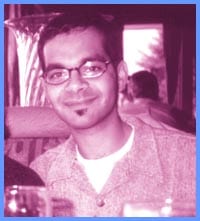Wayne van der Meide’s extended family found out he was gay from another relative.
“I was outed before I went there by an aunt here,” he says. “I think
they really expected me to walk off the plane in pumps and a dress.”
He was going back to Trinidad for a visit with his folks (he was already out to his parents).
Van der Meide is biracial, the son of a Dutch father and an
Indo-Caribbean mother. Born in Winnipeg, he spent much of his
adolescence in his mother’s home country of Trinidad, after his parents decided to move to the tropical island.
“I certainly knew from quite early on that I was gay,” he says. But it
wasn’t until he moved back to Canada around age 18 that he was confident enough to come out – and it wasn’t until five years ago that he interacted with his family in Trinidad as a gay man.
Then a question by a curious uncle “snowballed” and van der Meide found himself in the middle of his family’s first discussion on sexuality.
His aunt set him up with a closeted friend – “he was horrified, he had convinced himself that people didn’t know” – and van der Meide spent much of his vacation roving Trinidad’s underground scene of parties and bars, all of it advertised “purely by word of mouth.”
He sounds happy, and proud, of his family. “They were certainly confused, and they did not get it. But the bottom line was that I was who they remembered me to be, and they were very cool. I’d love to go back again.”
The 28-year-old is working on his masters of law at the University Of British Columbia. He’s finishing up his thesis, an exploration
of what same-sex spousal recognition will mean to those on the margins of the gay community – in his words, “people who are poor, people of colour, and women – and of course, those tend to overlap.”
Van der Meide’s not crazy about the focus Canada’s gay community has put on spousal recognition – a focus he says tries too hard to be
heterosexual, and “forecloses the opportunity of exploring how we as gay people differ from each other.
“Every time I have discussion with someone about spousal recognition being a gay issue, but a poor gay couple then losing
welfare not being a gay issue, I meet opposition. Whenever I try to
introduce race in the mix, that’s a different issue.
“This happens very often, in day-to-day discussions with white gay men.”
“If I’m brown and gay, I have some additional identity, in addition to
being gay,” says van der Meide. “Gay is thrown around as some kind of universal when it’s not.”
Being biracial as well as gay is an identity van der Meide has struggled with in his life.
He says mainstream gay political organizations are still very
white, very male, and very middle class. He says whites in the gay
community need to realize that race isn’t an identity “in addition to” being gay.
“I am consistently and constantly trying to identify that
whiteness,” he says. “I try to articulate [to whites] that they also
have a race. So far they don’t need to recognize that – but they
should.
“I’ve internalized a lot of racism, and coming out only emphasized
that,” he says. “We exoticize white skin highly. I do, I
m honest enough to admit that. Those of us who are attracted to other men of colour are few and far between.”
Van der Meide says other queers of colour need to accept each other, and themselves. This includes him.
“I’m trying to work on my own shit,” he says. “It’s hard.”

 Why you can trust Xtra
Why you can trust Xtra


